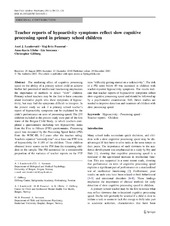| dc.contributor.author | Lundervold, Astri Johansen | |
| dc.contributor.author | Posserud, Maj-Britt Rocio | |
| dc.contributor.author | Ullebø, Anne-Karin | |
| dc.contributor.author | Sørensen, Lin | |
| dc.contributor.author | Gillberg, Christopher | |
| dc.date.accessioned | 2011-11-21T08:54:16Z | |
| dc.date.available | 2011-11-21T08:54:16Z | |
| dc.date.issued | 2011 | eng |
| dc.identifier.issn | 1018-8827 | |
| dc.identifier.uri | https://hdl.handle.net/1956/5199 | |
| dc.description.abstract | The mediating effect of cognitive processing speed on the ability of a primary school child to achieve his/her full potential of intellectual functioning emphasizes the importance of methods to detect ‘‘slow’’ children. Primary school teachers may be the first to have concerns about inattentive pupils who show symptoms of hypoactivity, but may find the symptoms difficult to interpret. In the present study we ask if a primary school teacher’s report of hypoactivity symptoms can be explained by the child’s performance on tests of processing speed. The 255 children included in the present study were part of the first wave of the Bergen Child Study, in which teachers completed a questionnaire including two hypoactivity items from the Five to Fifteen (FTF) questionnaire. Processing speed was measured by the Processing Speed Index (PSI) from the WISC-III, 1–2 years after the teacher rating. Teachers reported ‘‘certainly true’’ on at least one FTF item of hypoactivity for 11.8% of the children. These children obtained lower scores on the PSI than the remaining children in the sample. The PSI accounted for a considerable proportion of the variance of teacher reports on the FTF item ‘‘difficulty getting started on a task/activity’’. The risk of a PSI score below 85 was increased in children with teacher-reported hypoactivity symptoms. The results indicate that teacher reports of hypoactivity symptoms reflect slow cognitive processing speed and should be followed up by a psychometric examination. Still, future studies are needed to improve detection and treatment of children with slow processing speed. | en_US |
| dc.language.iso | eng | eng |
| dc.publisher | Springer | eng |
| dc.rights | Creative Commons Attribution Noncommercial | |
| dc.rights.uri | https://creativecommons.org/licenses/by-nc/2.0 | eng |
| dc.subject | Hypoactivity | eng |
| dc.subject | Children | eng |
| dc.title | Teacher reports of hypoactivity symptoms reflect slow cognitive processing speed in primary school children | eng |
| dc.type | Peer reviewed | |
| dc.type | Journal article | |
| dc.description.version | publishedVersion | |
| dc.rights.holder | Copyright the Author(s) 2011 | |
| dc.identifier.doi | https://doi.org/10.1007/s00787-010-0153-1 | |
| dc.identifier.cristin | 842829 | |
| dc.source.journal | European Child and Adolescent Psychiatry | |
| dc.source.pagenumber | 121-126 | |
| dc.subject.nsi | VDP::Medical disciplines: 700::Clinical medical disciplines: 750::Psychiatry, child psychiatry: 757 | eng |
| dc.identifier.citation | European Child and Adolescent Psychiatry 20(3): 121-126 | |
| dc.source.volume | 20 | |
| dc.source.issue | 3 | |

